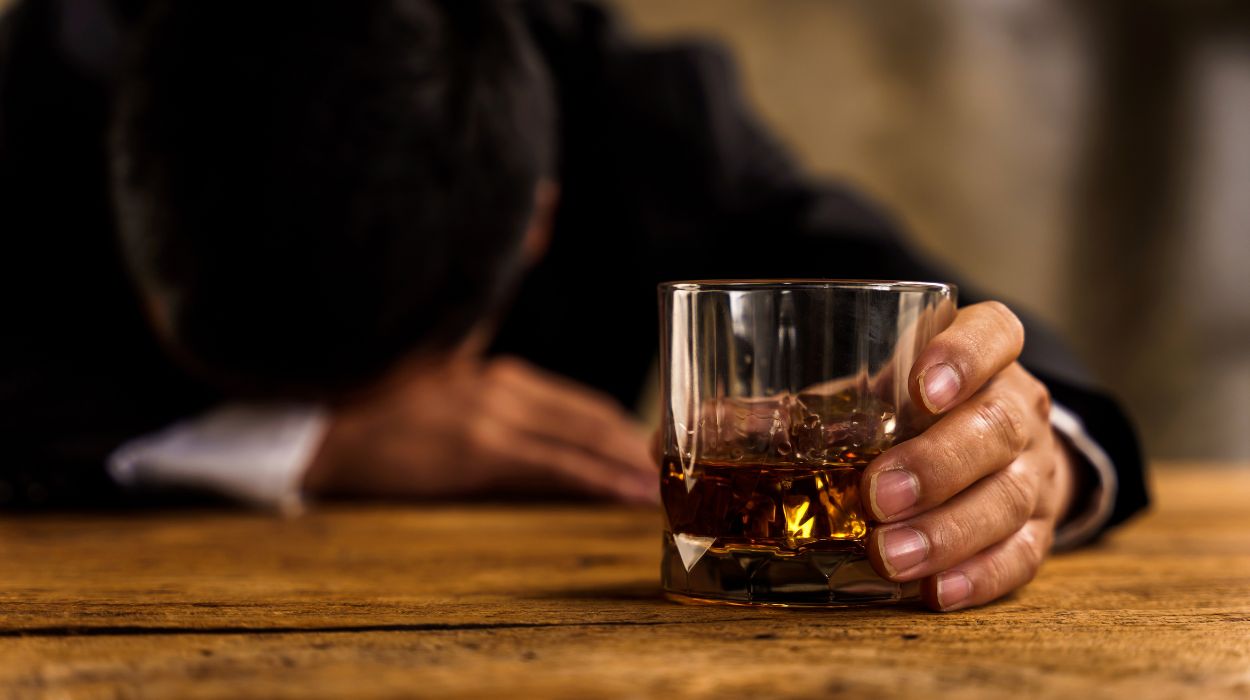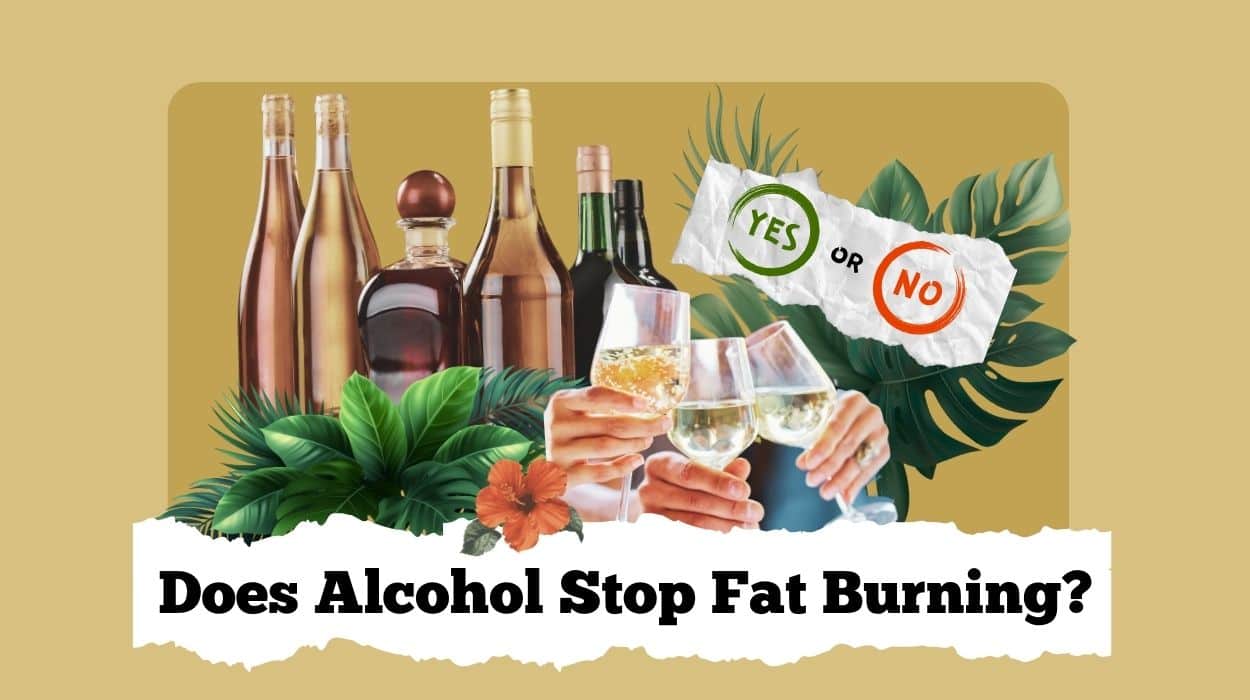We are all too familiar with alcohol and its inclusion in beverages, foods, and desserts.
In this article, I have covered some of the many negative effects of alcohol misuse, mainly surrounding alcoholism and weight gain. Does alcohol stop fat-burning and losing weight?
Does Drinking Alcohol Stop Fat Burning?
Consuming alcohol may disrupt the oxidation of fatty acids[1] as an energy substrate during the Krebs cycle, but this disruption does not affect overall weight loss. However, alcoholic beverage misuse does affect total caloric intake and lipid metabolism rate which interfere with weight management.
Does Drinking Alcohol Stop Fat Burning?
Reading the heading, you might be asking yourself ‘Does alcohol stop fat burning?’
Well, alcohol may disrupt the oxidation of fatty acids as an energy substrate during the Krebs cycle.
However, this disruption of lipolysis (fat oxidation) does not affect overall weight loss.
There are two main variables that interfere with weight management, which include;
- Total caloric intake
- Lipid metabolism rate
Alcoholic beverage misuse negatively affects both of these variables in many ways, over differing periods of time.
How Long Does Alcohol Stop Fat Burning?
The duration that ‘fat burning‘ is ‘hijacked’ will depend on the dose of alcohol and the rate of fat metabolism.
This is entirely dependent on the individual, but on average, we are looking at 24 hours.[2]
How Does Drinking Alcohol Affect Weight Loss?
The “Empty” Calories In Alcohol
Alcohol affects weight loss and can be classified as its own nutrient, independent of the three macronutrients: dietary protein, fat, and carbohydrates.
Unlike macronutrients, alcohol has no nutritional benefits.
This notorious substance contains 7 Kcal per gram, which can accumulate at accelerating rates due to its concentration in small quantities of most adult beverages.
In fact, one medium glass of red wine contains around 2.3 units of alcohol (18.4g), which is equal to 128.8 calories.
Now imagine ingesting 3 medium glasses of red wine in the night, that is a whopping 386.4 extra CALORIES!
This is not too far-fetched, as the statistics in England alone show that 30% of men and 15% of women drink alcohol more than 14 units of alcohol per week, with a majority coming from the weekend.
Can Alcohol Consumption Be Used As A Primary Source Of Fuel?
Most of us are glycogen/glucose adapted, therefore carbohydrate is our prime fuel source.
Carbohydrates are consumed and then stored as glycogen in the muscle, liver, and brain to be used later.
Unlike carbohydrates or even ketones (fat), alcohol is a poor source of energy as it only has a 15% metabolizable value,[3] hence why it is regarded as ’empty calories’.
Alcohol Affects Judgment Calls… Especially With Food
Alcohol is an intoxicant, when high amounts of alcohol consumption it may interfere with neural pathways (brain), thus reducing judgment.
With reduced judgment calls, you may opt for certain foods that are high in fat and calories.
In the UK, it is common for ‘drunks’ to go for a big greasy donner kebab and chips, yielding up to 2000 calories.
All in all, these calories drive toward the unwanted caloric surplus, which may hinder weight management.
Drinking Alcohol Affects Digestion And Nutrient Uptake
High quantities of alcohol may decrease the production of digestive enzymes via the pancreas, therefore hindering digestion.
Likewise, alcohol may degrade the cell lining of the intestines and stomach, thus negatively impacting nutrient uptake.
How Does Alcohol Contribute To Excess Belly Fat?
You may be asking, ‘Why does drinking alcohol stop fat burning?’
There are two main mechanisms by which alcohol may contribute to weight gain and excess belly fat, which have been highlighted below.
The ‘Caloric Surplus’ From Alcohol
Current research suggests that 1lb of body fat is equivalent to 3500 calories.
Over time, the body weight scale can tip in either direction, depending on if you are under or over your caloric maintenance.
As we have already established, the ’empty’ calories in alcohol increase the risk of a caloric surplus (over-caloric maintenance), thereby accumulating body and belly fat.
To put this into perspective for the layman, a caloric surplus is eating and drinking more calories than the human organism needs to maintain its current body weight.
For example, let’s say your average maintenance calories (calories to maintain body weight) sit at roughly 2000 calories per day.
The diet and exercise regime are going great. It comes the weekend and you become ‘trigger-happy’ with the drinks and guzzle 18-20 units of alcohol (144-160g of alcohol).
This short drinking bout can add as much as an extra 1120 calories, giving a weekly average of 2160 calories per day (160 calories too many).
Over the course of 3 weeks, you could expect a 1lb weight gain, contributing to the body weight and belly fat.
Note that the example above is generic and caloric requirements vary from person to person.
Alcohol And Muscle Protein Synthesis (MPS)
The body is constantly synthesizing (building) and decomposing muscle proteins (breaking down).
This mechanism can be influenced by acute dietary intake, which may link to long-term changes in muscle mass and body fat.
How is alcohol consumption?
For every 1lb of muscle mass, we burn 7-10 calories, which can dictate long-term body and belly fat.
A 2014 study by Steiner and Lang found that MPS can drop by 15%[4] 30 minutes after high alcohol intake.
Overall, Alcohol consumption has the potential to reduce protein signaling, muscle mass, and metabolism, contributing to the long-term body and belly fat.
How Does Drinking Alcohol Bring Negative Effects?
Alcohol Affects Your Organs
There are a number of organs that can be chronically damaged by alcohol misuse.
These organs[5] include the: liver, brain, heart, and pancreas.
The most commonly affected organ is the liver, due to having to decompose the toxins within alcohol.
Over time, a layer of fatty tissue can build around the liver, increasing the risk of liver failure.
Alcoholic Drinks Affect Your Sleep

Without delving into too much detail, there are 4 stages of sleep (falling asleep, light sleep, deep sleep, and REM sleep).
REM or the dream stage is crucial for restoring brain and body health, in terms of muscle fibers, hormones, alertness, mood, etc.
High levels of alcohol in the bloodstream have been shown to elongate the time it takes to get to sleep and impair REM.[6]
Alcohol Consumption Affects Sex Hormones
Alcohol is especially risky in males.
Reduced REM sleep could cause poor restoration of the male hormone testosterone, thus increasing the ratio of the women’s hormone estrogen.
This coupled with interactions between alcohol and the chemicals in the hypothalamus/pituitary gland of the brain, you could expect an impairment in testosterone[7] pathways over the long term.
Subsequently, this could reduce libido, sexual arousal, and sperm count.
Furthermore, the disruption in the nervous system may reduce blood flow to the penis.
This would prolong the onset of an erection and reduce the overall quality.
Best Low-Calorie Alcoholic Drinks For Body Weight Loss

For most of you, an alcoholic drink here is important for social gatherings and parties.
The better option would be to opt for an alcoholic drink that has a lower alcohol content.
I have highlighted a few drinks below.
Lite Beer
A lite beer (2% alcohol) is a great low-calorie alternative to a regular pint, as it only contains 1.1 units of alcohol (8.8g/61.6 calories).
Let’s just say that you get more ‘bang for your buck’, as lite beer will give you more drinks per serving compared to rum or vodka.
Vodka (40% Alcohol)
Does Vodka stop you fat burning?
Possibly, but a serving is lower in alcohol and calories compared to many drinks.
Vodka stands at 40% ABV but only contains around 1.4 units of alcohol per 35 ml serving, which is equivalent to 11.2g of alcohol and 78 calories.
I would not suggest more than a serving per night.
Rum (40% Alcohol)
Rum has a similar alcohol content compared to vodka with an ABV of 37.5-40%.
Many prefer a smaller 25 ml serving of rum, which is equivalent to 0.9 units of alcohol or 7.2g (50.4 calories).
Whisky (40% Alcohol)
On par with many other drinks Whisky has an ABV of 40%.
A 50 ml serving will yield 2 units of alcohol or 16g with a low 112 calories.
Conclusion
Alcoholic beverages consumed in high amounts can cause one to gain weight through their ’empty calories, and long-term dip in skeletal muscle/metabolic rate.
Alcohol can hinder activity and exercise as it interrupts the body of other preferred energy substrates, like fatty acids and glucose.
The substance reduces judgment, therefore you are likely to go for high-calorie foods, increasing the risk of weight gain.
Other negative effects include organ damage, sleep, hormone balance, and the processing of nutrients.
If you do drink, the take-home message would be to opt for a beverage with a lower amount of alcohol per serving and limit servings.
Frequently Asked Questions
The alcoholic beverages that contain the most calories have the greatest potential to drive a caloric surplus, these include;
– Pina colada
– Craft beers
– Soft drink Infused drink (i.e. Coke and JD)
High amounts of alcohol can hinder weight and body composition through ’empty calories’ and long-term muscle loss.
 Expert's opinion
Expert's opinion
